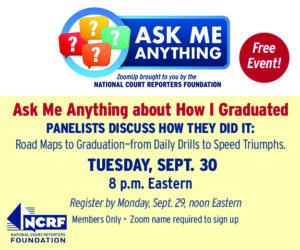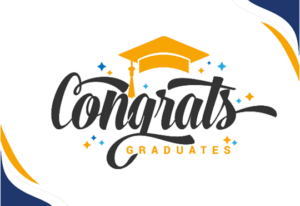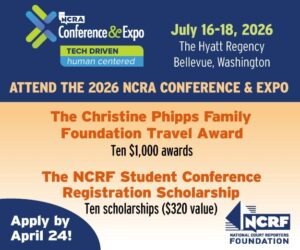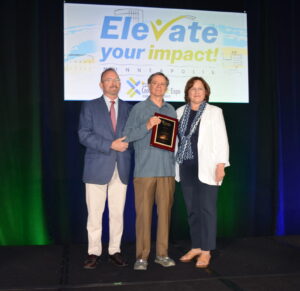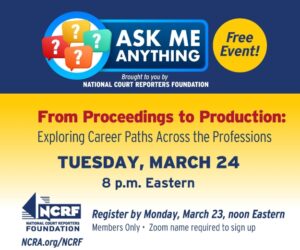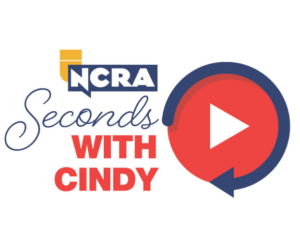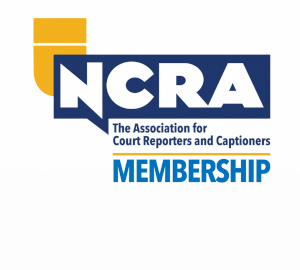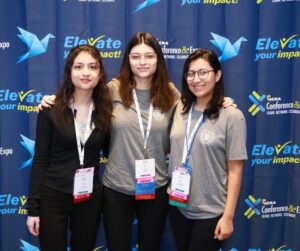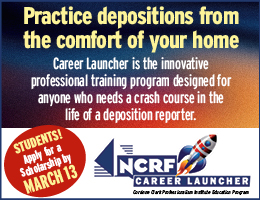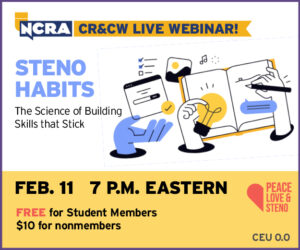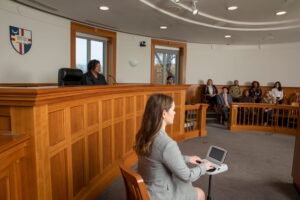By Liane Hatch
I’m not exactly sure where this figure comes from, but there’s a ubiquitous claim all over the online spaces where court reporting students and prospective students gather. I’ve seen it cited more times than I can count, from Facebook to Reddit to Discord. It’s sometimes used to encourage us and make us feel like a special, gifted few, and other times it’s meant to give us a hard reality check and force us to consider the path ahead.
The claim goes like this: Only 10 percent of court reporting students finish school. Only 10 percent of us make it. Court reporting has a 90 percent dropout rate. Most of us fail.
Now I actually take issue with this claim for a number of reasons, but that’s not the point. The point is that many of us saw that number as prospective students, and whether it terrified us or filled us with the thrill of a challenge, we signed up anyway. And here we are. We’re doing it. We’re making it happen. We’re figuring it out.
That was the first test. Before we even opened our theory books or wrote our first strokes or memorized our first briefs, we passed the first test by signing up at all. Simply put, we saw what we wanted for ourselves, and we put ourselves in a position, perhaps against the odds, to make it a reality.
And that’s exactly what we need to be doing when it comes to scholarships.
In my 3.5-ish years as a court reporting student, I’ve seen time and again just how eager many working court reporters are to watch steno students succeed. The National Court Reporters Association (NCRA) and its philanthropic arm, the National Court Reporters Foundation (NCRA), offer a bevy of scholarships and grants for students, interns, and new professionals. And if we’re not applying for them – if we’re looking at the requirements and deciding not to follow through – we’re leaving money on the table.
I myself have been honored to be selected as a recipient of several of those awards. My goal, I hope you will understand, is not to brag, but to show my fellow students the value of putting ourselves out there.
So here’s what you need to do:
Stay Tuned In
Subscribe to the JCR online and the Up-to-Speed newsletters and actually read them. Skim the headlines if you need, but be sure to at least glance at the information NCRA sends you. When NCRA and NCRF open applications for existing scholarships or offer new scholarships, that’s where you’ll find those announcements. Same goes for any state associations you might be involved with. Check their websites and read their newsletters to see if they offer any scholarships or assistance.
And here’s a tip – the Virginia Court Reporters Foundation offers all students – not just Virginia residents – the chance to apply for their Carolyn M. O’Conner education scholarship. Applications are due at the end of January each year, so stop what you’re doing right now and put a note in your calendar for December 1 reminding you to check.
Plan Ahead
Each scholarship is going to have different requirements. Take a look at NCRA’s scholarship page and read carefully through each one. You may find that you’re outright ineligible for some of them – just like I was ineligible for the NCRA A to Z® scholarship because I did not complete the NCRA A to Z program. No big deal, just move on to the next.
Then you’ll find that you’re not eligible yet for certain scholarships because many of them have certain speed requirements. That’s where you’ve got to make an honest self-assessment. Where am I in speed right now? Where do I need to be? How long might it take me to get there? There will likely be times when you just don’t make the cutoff by the application deadline. That’s always a bummer, but there’s always next year. Keep those in mind for when you do reach those speeds.
Give Yourself Time
Give these scholarships the time and attention they deserve. Put time and thought into them. When they require an essay, start with an outline, then a rough draft, and then continue to craft from there. Ask your mentor or friend to proofread it before you submit. Don’t rush the process, and don’t ask any references to rush on your behalf. Being the first to apply doesn’t get you any extra points and being the last to apply doesn’t dock any points. You want your application to look good, so take your time. And yes, any time you spend working on your application is time you’re not spending practicing, so be mindful of that and budget your time appropriately.
Don’t Take it Personally. Just Adapt.
You might not win them all. You probably won’t win them all. It’s not personal, and it wasn’t a waste of time. There’s value in the process regardless. If you didn’t win this time but will be eligible again next time, then great! You’ve got your rough draft ready for next year.
In fact, the essay I wrote for the 2024 VCRF Carolyn M. O’Conner scholarship – which I did not win that year – actually became the rough draft of my 2024 Phipps Family Foundation Travel Scholarship essay, and I did win that one.
Additionally, as long as you exercise tact, I have found that there’s no harm in respectfully asking for feedback if you didn’t get the result you wanted. Some of these scholarships are just luck-of-the-draw, and maybe your name wasn’t one of the ones pulled out of a hat. But when there is an evaluation process and a board or panel or judge determining who will receive the awards and who will not, you may be able to solicit feedback on what could make your application stronger for next time. Just remember that you’re not asking to argue with their decision; you’re asking so can learn and grow.
Apply.
I can’t promise that you’ll win every scholarship you apply for, but I can promise that you’re not winning any scholarships unless you apply. So tune in, plan ahead, take your time, and apply. And if it doesn’t work out this time, try again next time.
So what scholarship application will you be tackling first? Whatever it is, I wish you the best of luck.
Liane Hatch, from Whispering Pines, N.C., is a student at College of Court Reporting. She can be reached at liane.b.hatch@gmail.com





